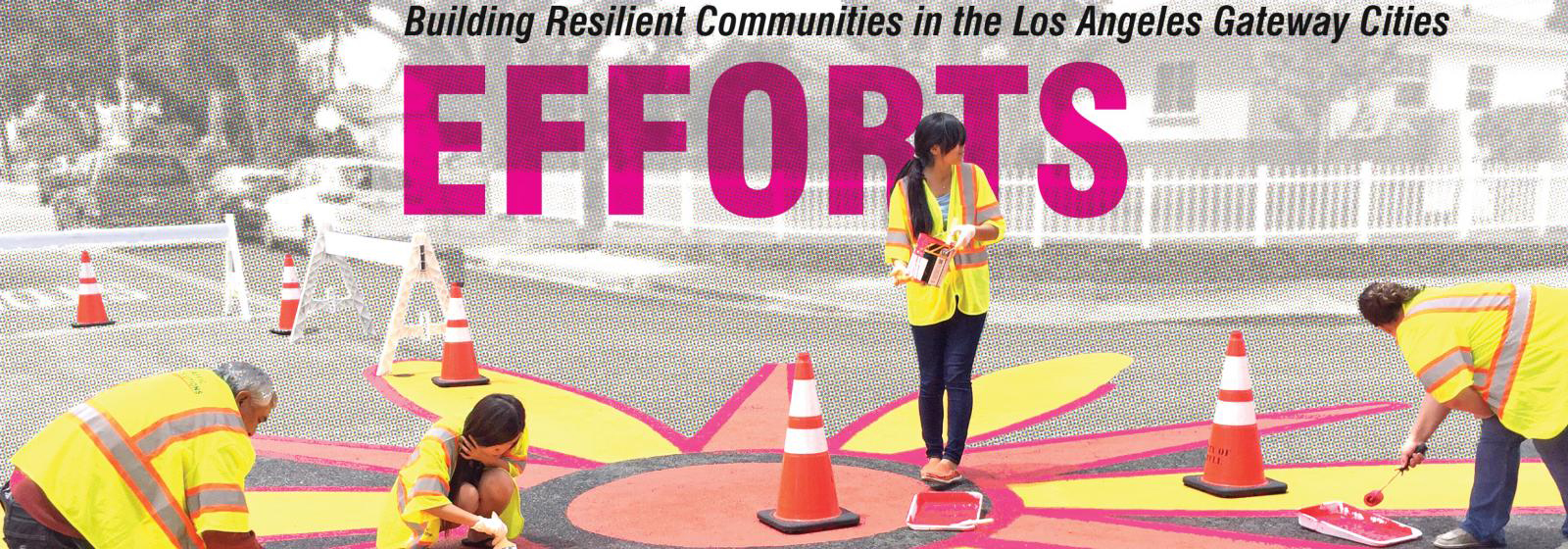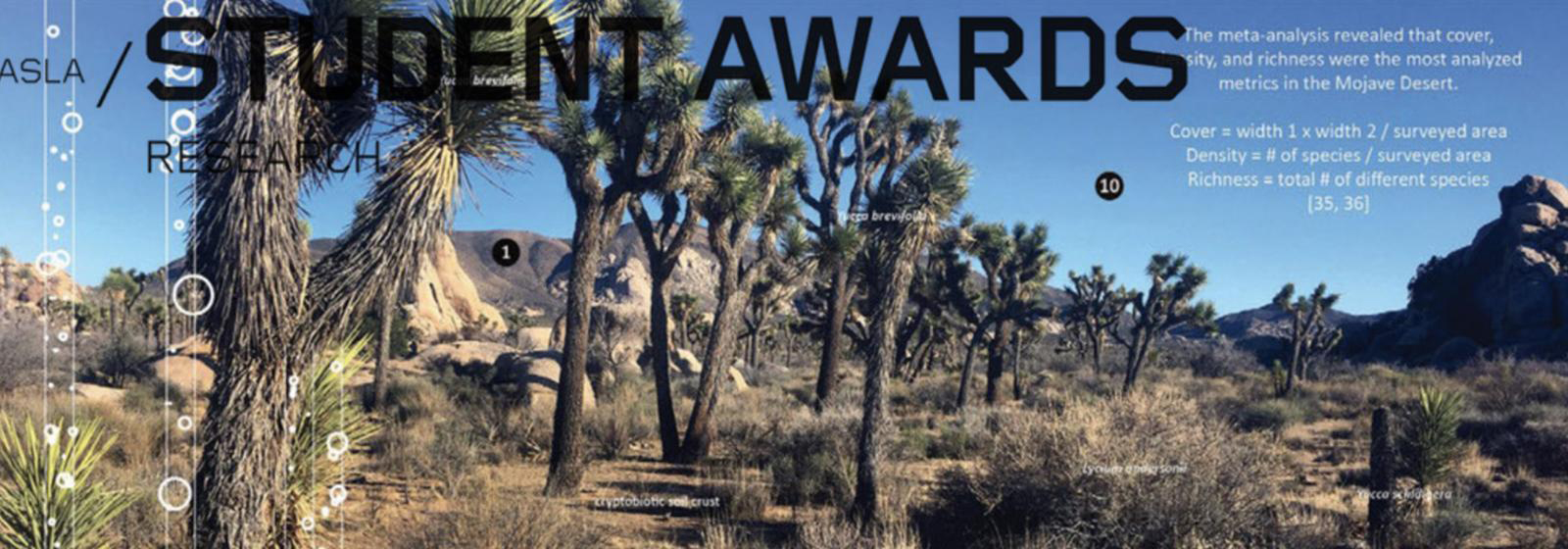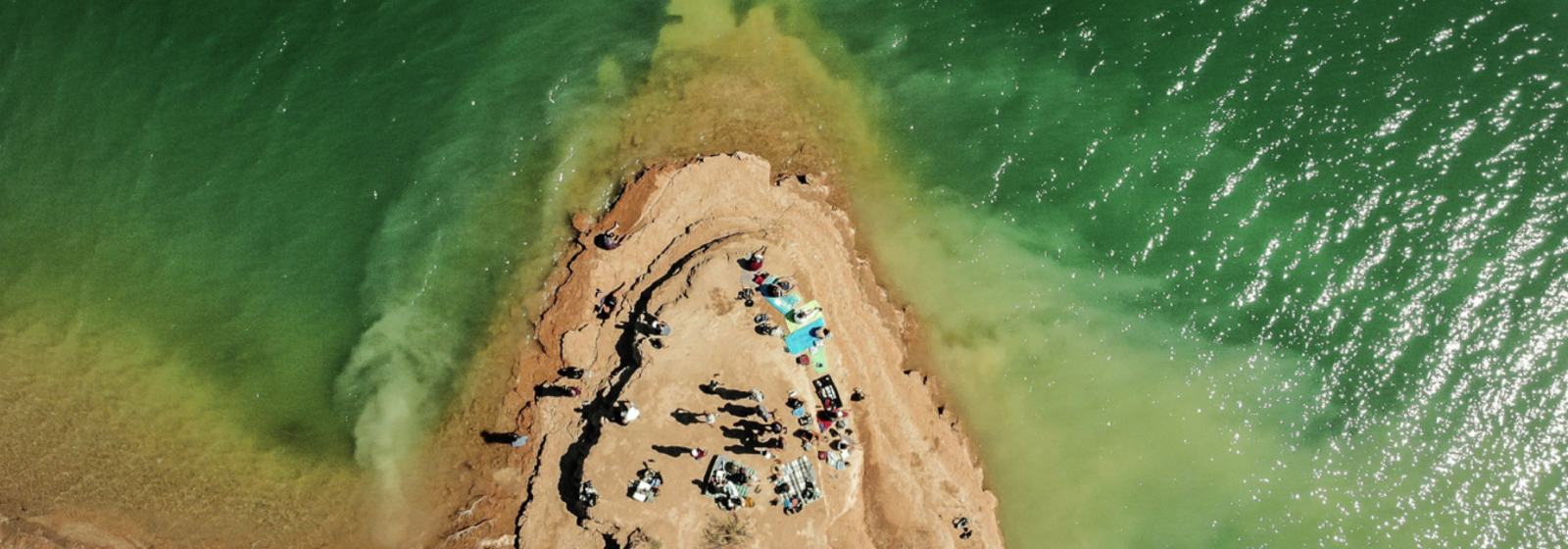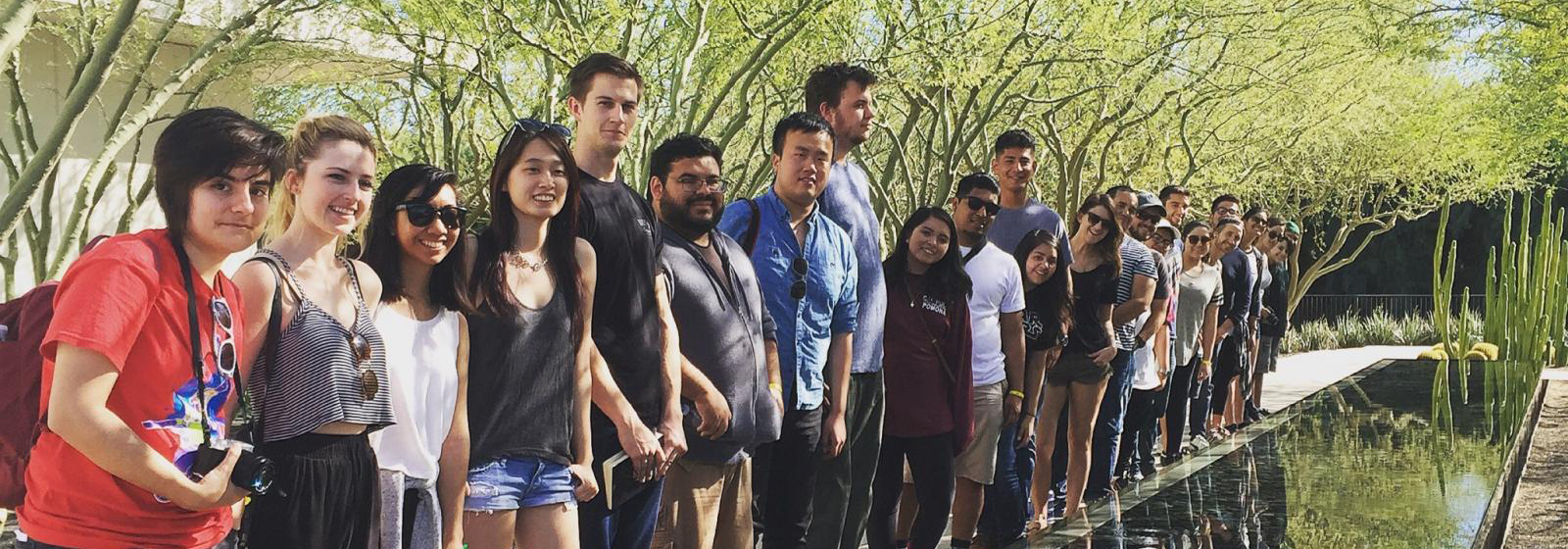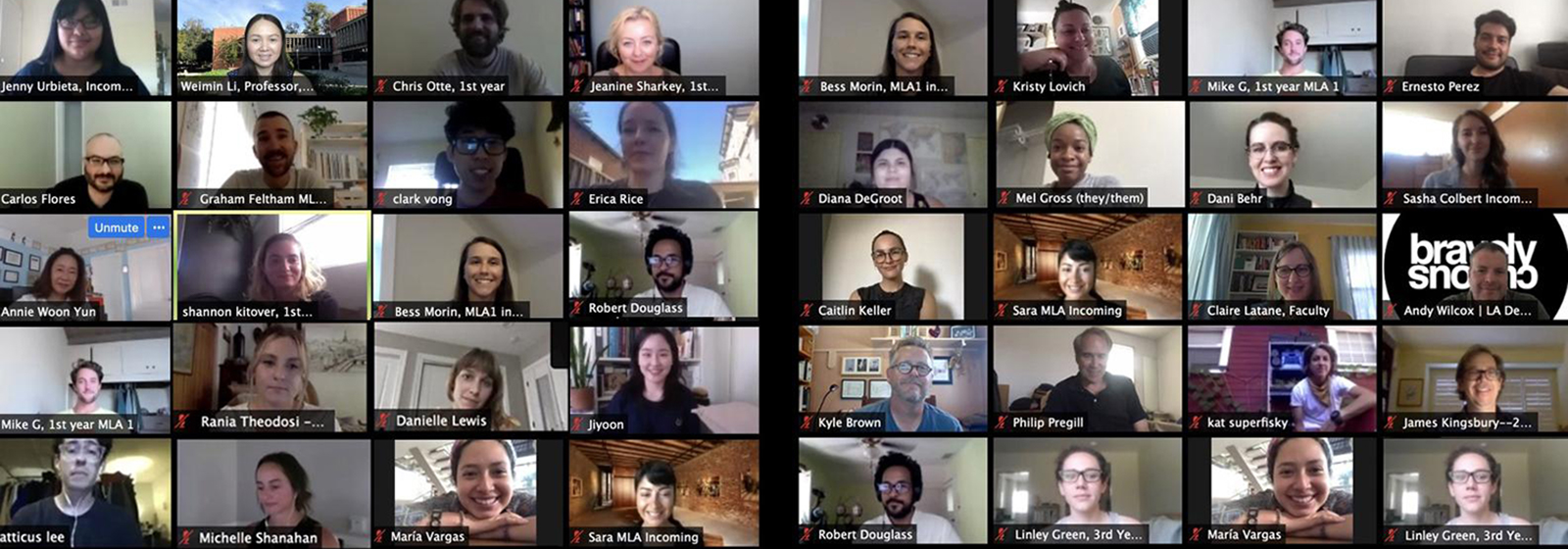Welcome
We Design for the Public Good.
Welcome to the Department of Landscape Architecture at Cal Poly Pomona (CPPLA)! Cal Poly Pomona offers landscape architecture students a truly unique learning environment. Our location in the heart of Southern California gives students easy access to the cultural centers of Los Angeles County and the City of Los Angeles as well as the mountains, beaches, and deserts all within an hour's drive. For students seeking meaningful careers, our landscape architecture programs provide the knowledge, skills, and values necessary to design for human health and wellbeing, ecological health, and environmental and climate justice.
Working at the intersections of ecology, culture, engineering, and design, Landscape Architects give shape and form to gardens, parks and plazas; manage and conserve wildlands; and advocate and plan for social, environmental, and climate justice. The CPPLA curricula provide undergraduate and graduate students a foundation of professional skillsets in design, visual communication, ecology, planning processes, plant ecology and planting design, site engineering methods, sustainability and regenerative design, theory, and history. Instruction fosters the development of creative and problem-solving abilities, communication skills, technical knowledge, environmental and cultural awareness, and professionalism within a highly collaborative design community. Our students benefit from our deep network of CPPLA alumni and firms spread throughout Southern California, hosting site visits and visiting our design studios.
The Department of Landscape Architecture at Cal Poly Pomona has been serving Southern California for more than 60 years through landscape architecture education. We encourage you to explore this site to learn more about studying Landscape Architecture in our Bachelor of Science in Landscape Architecture or Master of Landscape Architecture programs.
For those who are interested in joining us
We strongly recommend all interested applicants watch the webinar below, which talks about the difference between teaching as a lecturer and joining a tenure-track position here or elsewhere, please review the webinar below:
- College of Environmental Design webinar "Demystifying the Tenure-Track Application Process 2022"
A large and highly valued part of our faculty are non-tenure-line lecturers. We are currently not hiring, but we are happy to accept your letter of interest and CV in case one or more classes opens in the near future. If you are interested in joining our instructor pool, please send your CV and a letter of interest to: calatane@cpp.edu.
Are you a prospective student who wonders what life is like as a Landscape Architecture major? Are you a current student or alumni who wants to keep up with the department and industry events?
Then you should follow us on social media!
EMERGENCY INFORMATION
- From an on-campus phone… University Police Department Dispatch call 911.
- From your cell phone… University Police Department Dispatch call 909-869-3070.
Studio/Lab Facility (Applies to both Graduate and Undergraduate Studios)
- All aisles and doorways are to remain clear.
- Fire extinguishers are at specific locations in the studio/lab. Become familiar with where they are located and know how to use them. All fire extinguishers must be keep clear of obstruction at all times; minimum 5’ radius.
- All studio desks and tables must be covered by the end of the first-week of studio. It is the student’s responsibility to cover their entire table(s), edge to edge, with thick chipboard, a cutting mat, masonite or other protective surface. Any student not in compliance will not be allowed to continue working in studio until in compliance.
- Do NOT bring personal furniture or appliances into the lab. All non-CPP owned furniture or appliances can be removed at anytime. Any student in need of material accommodation will be accommodated and should be coordinated through the department office.
- Everyone using the lab is responsible to assure that floors are free from trip or slip hazards. Desks or other furniture are to be arranged so that people cannot trip over floor monuments or extension cords.
- Students may not construct personal studio partitions studios spaces. No partition or individual’s studio desk may be covered overhead with a semi-permanent or temporary structure of any kind.
- Any student found responsible for damaging individual studio tables, shared studio tables, studio equipment, outdoor work surfaces, outdoor floor surfaces or any other university owned property or facility will be referred to the ENV Dean and Student Affairs.
First Aid & Personal Protective Equipment
- First aid supplies available in the studio/lab. The kit is inspected periodically by ENV staff. If you use the supplies in the kit please notify a staff member so that it can be re-stocked.
- It is the responsibility of each student to provide their own Personal Protective Equipment (PPE) while working in the studio/lab. PPE may include, but not limited to eye protection, gloves, long sleeve clothing, closed shoes, respirators, etc. It is also the responsibility of each student to keep their PPE in good condition and to wear such equipment wherever and whenever appropriate. Open-Toed Shoes are NOT allowed in the studio/lab.
Hazardous Materials & Chemical Safety
- Spray products or aerosol propellants, including spray mounts cannot be used indoors.
- Chemicals or chemical-based products being used in the lab must be in the manufacturer’s container, with an accurate label and an SDS must be on file. All material that off-gasses may only be used in designated outdoor work spaces. Any treated material (included but not limited to paint, polyurethane, stain, etc.) may not be stored indoors.
- Concrete cannot be stored, mixed or used indoors.
- Do not dump waste concrete mix or rinseate from containers in the dirt or planters. Use only approved waste collection containers.
- There is a limited list of hazardous materials that can be brought to campus from home. These materials must be in the manufacturer’s original container, have the student’s name on the container and have the manufacturer’s Safety Data Sheet (SDS). The manufacturer should provide the SDS, but it can also be found on the manufacturer’s website.
The material must be stored in the appropriate storage locker designated for the type of material. Remember, “If you can’t use it safely, please do not bring it on campus.”
If there is waste material a hazardous waste manifest must be completed and Environmental Health and Safety disposal procedures followed. (Call EH&S at x4697 for more information). It’s best to be “Green”!
Any hazardous material left in a locker at the end of the class term will be destroyed of appropriately.
Tool and Equipment Maintenance & Safety
- Electrical/Ethernet floor, wall or hanging monuments and other outlets are not to be overloaded or damaged. Multiple plug adapters cannot be used, and (for outdoor outlets) weatherproof covers must be in place.
- Electrical extension cords must NOT be brought from home. Use of an extension cord is only temporary, less than 1-day. Prior to each use check for any damage. If frayed or tampered with in any way do NOT use. When in use prevent trip hazards. Extension cords should be stored when not in use. Report damaged cords to a Studio/ENV staff member or to your instructor.
- All tools (hand and power) and equipment are to be maintained per manufacturer’s instructions and be in good working condition. All manufacturer’s guarding must be in place at all times during use. All electrical equipment must be grounded. All tools must be used for their intended purpose and must not be left unattended at anytime. Report any malfunction, damaged or missing guards to a Studio/IDC staff member or to your instructor.
- No power or sanding tools shall be used indoors except in the ENV Model Shop and Art Wood Shop. A Studio/ENV staff member or a designated student assistant must be present when such tools are in use.
- Hand and/or power tools brought from home should not be shared with/used by anyone other than the person who owns the tools. As in #16 above, the tool must be in good condition, guarded and used only for its intended purpose. Personal tools that are used improperly or in prohibited locations may be confiscated. They will be returned to the student to remove from campus.
- If you have questions and/or if you need training on any of the information discussed, please notify a Studio/ENV staff member or your instructor prior to working in the lab.
Safety Inspections & Reporting Concerns
- ENV staff will perform periodic, scheduled safety inspections of the studio/lab facility and equipment.
- If you see something say something. Report any and all safety concerns including but not limited to: equipment malfunctions, missing guards, improper use of equipment, hazardous material spills, etc., promptly to a Studio /ENV staff member or to your instructor.
- Report all injuries and/or near miss incidents to a Studio/ ENV staff member or to your instructor.
- Reporting of safety concerns can also be made anonymously to the Environmental Health & Safety Office.
General Housekeeping
- RECYCLING: The College supports recycling. Bins are made available for a variety of materials. When using these bins, please take care not to contaminate one sort of material with another; contaminated materials often cannot be accepted for recycling. If necessary, students may be asked to help move student-owned recyclable materials to a recycling center.
- REUSABLE MATERIALS :In an effort to reduce waste, all ENV Departments encourage the reuse of project materials such as cardboard, Styrofoam, model bases, castors, basswood and other wood products. This reusable material will be collected and sorted and will be available free to students. Please confirm with your with studio staff the location of reusable modeling, and other art and design products. Please coordinate with your studio coordinator on how to acquire such reusable material.
- STUDIO CLEAN-UP SCHEDULE: Students are required to clean-up the workspace and general studio areas of the Studio every Wednesday at the beginning of their studio times for the duration of 20 minutes throughout Fall, Winter and Spring quarters. Each individual student is responsible for inside and outdoor areas and needs to use sound judgement in storing or disposing waste material. If you have questions in this regard, ask a Studio /IDC staff member or your instructor.
- Every individual course coordinator or instructor is asked to help with the coordination and execution of this clean-up schedule in a safe and disciplined manor.
- This regular schedule is in addition to other ordered clean-up events as per studio faculty and department office.
General Policies
- Students are requested to respect the studio environment of others. Do not create a condition where your colleagues cannot work safely in the studio environment. Reporting of safety concerns can be made anonymously to the department office, the ENV Dean’s office or the Environmental Health & Safety Office.
- Students are requested to respect the studio environment of others. Do not use other student’s desks, tables or studio spaces without direct consent- please ask. The department often has to share studio space for different courses; please be respectful of the person who occupies the desk you sit at.
Landscape Architecture Accreditation Board (LAAB) accredited programs are required to provide reliable information to the public. Programs must report on accreditation status and its performance. This information is to help potential students make informed application decisions.
MISSION, GOALS, and OBJECTIVES
Mission
Our polytechnic, hands-on landscape architecture education empowers students with the knowledge, skills, and values to succeed in careers that shape the natural and built environments through design. We work with community partners on real-world solutions toward social, environmental, and climate justice in Southern California and beyond. Our alumni—known for their technical expertise and creative solutions to pressing issues—work in firms, non-profits, public agencies, organizations, and industry around the world.
Vision
We design for the public good. Cal Poly Pomona’s Department of Landscape Architecture prepares students to become leaders and change-makers in their communities through community-led, nature-based, climate adapted design.
Goals and Objectives
- To holistically strengthen our curricula to reflect the urgency of climate change
- Integrate a stronger focus on climate and social justice into our foundational first two years
- Add an upper-level course with a focus on climate justice and advocacy through a landscape architecture perspective
- Better articulate climate adapted regenerative design in our course learning objectives in every design lab
- To refine and strengthen our curricula to respond to the rapidly changing context of digital software for graphics and modeling
- In foundational years 1 and 2:
- Refine our existing LA 1581 Graphic Communication course to focus more on hand drawing and drafting
- Add a required second semester of graphic communication to focus on digital graphics
- Add an optional advanced course in GIS and/or other digital tools
- Add a construction lab to each construction seminar course in the 3rd year to provide time to go deeper with technology related to construction models and methods
- In foundational years 1 and 2:
- To engage a broader population of Cal Poly Pomona students in courses taught with a landscape architecture focus
- Recruit more students for the LA minor
- Develop one or more upper-level General Education synthesis courses related to landscape, climate change, and/or community-led design
- Actively seek faculty partners in other departments to create interdisciplinary opportunities for study and research
- To share our students’ and faculty’s exceptional work on our department website and in a variety of media outlets
- Train faculty on editing their faculty websites
- Create an easy pathway and a committee to document and collect work to share
- Resurrect the Annual Report
- Formalize mentorship for Tenure-Line faculty to support their success and wellbeing
- To become known for our varied and meaningful community partnerships and change-making through advocacy and design
- Develop a regular event, lecture, or webinar series to share our students’ work with current and potential community partners
- Support and encourage faculty to apply to present their work in a broad range of conferences, journals, and through the University Strategic Communications Office
- To increase Student Resources for Black, Indigenous, and Latinx students:
- Improve recruiting methods
- Create a scholarship fund
- Establish a paid under-represented student recruitment and retention coordinator
- Develop a lecture/film series of Black, Indigenous, and Latinx designers
- Provide team-building opportunities for students
- To revise the Curriculum to:
- Offer part-time and accelerated tracks in addition to full time
- Continue online and hybrid learning modalities in addition to in person
- Add a required course on race, culture, and racism in design
- Add a new student learning objective or revise the current student learning objectives to focus on equity and justice in planning and design practices
- Support the study of Black and Brown cultural landscapes
- Center authors and case studies from historically minoritized communities
- Improve the Program Culture and Support Faculty Development by:
- Increasing the number of under-represented faculty
- Providing anti-racist teaching training
- Rethinking the culture of design education
- Celebrating our students
- Building a strong community and sense of belonging
- Rewriting the faculty retention, tenure, and promotion criteria to value social and environmental justice, community-led design, and lived experience
- Identifying the characteristics of White Supremacist culture in our department
ACCREDITATION
The Bachelor of Science in Landscape Architecture (BSLA) and Master of Landscape Architecture (MLA) at Cal Poly Pomona are professional degree programs, nationally accredited by the Landscape Architectural Accreditation Board, and approved by the California Board of Landscape Architects as meeting the educational requirements for licensure eligibility. For more information on LAAB, see: http://www.asla.org/accreditationlaab.aspx
COST OF ATTENDANCE
The following information is summarized and provided for reference from the Office of Financial Aid website: https://www.cpp.edu/financial-aid/undergraduate/current/costs.shtml. For up to date information, please refer to the website.
A Cost of Attendance (COA), or Budget, is broadly defined as the average cost to attend Cal Poly Pomona for one academic year (Fall & Spring semesters).
Estimates below represent the typical cost for a student to attend Cal Poly Pomona for a 9-month period (Fall and Spring). Each institution has its own COA, reflecting the specific expenses associated with attending that particular campus. Cal Poly Pomona consistently ranks as one of the top 100 best values in public colleges, according to Kiplinger’s Personal Finance magazine.
The COA is not a bill and it is for informational purposes only. Costs include both direct expenses payable to Cal Poly Pomona, such as tuition and fees, and indirect estimated expenses (not payable to CPP), like personal expenses and transportation. Your COA budget helps you and the Financial Aid Office determine approximately how much money you need to attend Cal Poly Pomona, and how much financial aid you need to meet that goal.
Your actual cost of attendance will vary depending on your program, residency status, your specific personal living arrangements and costs, and if you have veterans benefits. Consider how your own costs might differ. Will you budget carefully and spend less than the estimates? Will you face other costs that are not listed? You can reduce expenses by having roommates, eating out less frequently, and commuting to campus by foot, bike or public transportation.
This section provides an estimate of the costs and fees for an academic year at Cal Poly Pomona.
California Residents
2025-2026 Cost of Attendance for California Residents (as of February 2025)
|
Expenses |
Commuter |
On-Campus Housing |
Off-Campus Housing |
|
Tuition & Mandatory Fees |
$8,148 |
$8,148 |
$8,148 |
|
Living Expenses |
$10,076 |
$16,370 |
$19,272 |
|
Books, Supplies, Equipment |
$1,062 |
$1,062 |
$1,062 |
|
Transportation |
$2,318 |
$1,824 |
$2,934 |
|
Personal Expenses |
$2,648 |
$2,456 |
$3,342 |
|
Direct Loan Fees |
$70 |
$70 |
$70 |
|
TOTAL |
$24,322 |
$29,930 |
$34,828 |
Non California Residents
2025-2026 Cost of Attendance for Non-California Residents (as of February 26, 2025)
|
Expenses |
Commuter |
On-Campus Housing |
Off-Campus Housing |
|
Non-Resident Tuition* |
$13,320 |
$13,320 |
$13,320 |
|
Tuition & Mandatory Fees |
$8,248 |
$8,148 |
$8,148 |
|
Living Expenses (Food & Housing) |
$10,076 |
$16,370 |
$19,272 |
|
Books, Supplies, Equipment |
$1,062 |
$1,062 |
$1,062 |
|
Transportation |
$2,318 |
$1,824 |
$2,934 |
|
Personal Expenses |
$2,648 |
$2,456 |
$3,342 |
|
Direct Loan Fees |
$70 |
$70 |
$70 |
|
TOTAL |
$37,642 |
$43,250 |
$48,148 |
*Non-Resident students are assessed the CA Resident Tuition and Fees, plus an additional $444 per unit in Non-Resident Tuition. The figure below is based on enrollment in 30 units for the academic year (15 units per semester).
The CSU makes every effort to keep student costs to a minimum. Fees listed in published schedules or student accounts may need to be increased when public funding is inadequate. Therefore, CSU must reserve the right, even after fees are initially charged or initial fee payments are made, to increase or modify any listed fees. All listed fees, other than mandatory systemwide fees, are subject to change without notice, until the date when instruction for a particular semester or quarter has begun. All CSU listed fees should be regarded as estimates that are subject to change upon approval by the Board of Trustees, the Chancellor, or the Presidents, as appropriate. Changes in mandatory systemwide fees will be made in accordance with the requirements of the Working Families Student Fee Transparency and Accountability Act (Sections 66028 - 66028.6 of the Education Code).
For information about establishing residency, see https://www.cpp.edu/admissions/residency/index.shtml
Scholarships and Financial Support: Students have the opportunity to apply for campus jobs and university and department scholarships to offset the cost of attendance. Students received the following scholarship amounts from Landscape Architecture Department scholarships over the past 5 years (Source: program records):
|
Scholarships |
2019-20 |
2020-21 |
2021-22 |
2022-23 |
2023-24 |
2024-25 |
|
Number Awarded |
23 |
15 |
23 |
48 |
31 |
17 |
|
Amount Awarded |
$51,500 |
$25,500 |
$57,500 |
$70,500 |
$83,000 |
$38,500 |
For information on Departmental Scholarships, visit: https://www.cpp.edu/env/landscape-architecture/academicstudent-resources/scholarships.shtml
LIST OF REQUIRED AND OPTIONAL MATERIALS AND EQUIPMENT
Required Equipment
(estimated costs ~$2,000 on the low end, ranging up to $4,000+ for higher-end equipment)
- Laptop or access to a computer with the following specifications and software (check for student discounts and payment plans in the Bronco Bookstore):
- Specifications
- CPU: Intel Core i7 or i9 13th or 14th generation, Intel Core Ultra 9, or AMD Ryzen 9
- Memory: 32-64 GB RAM Memory
- Storage: 1 TB SSD minimum, plus 4 TB or bigger external drive
- Display: 14-16” inch display, 4K resolution
- Graphics card: 8GB or more VRAM
- 1080P webcam
- Specifications
-
- Software
- Microsoft Office Suite (Word, Excel, PowerPoint)
- Adobe Creative Cloud (Photoshop, InDesign, Illustrator)
- AutoCAD
- Rhino 3D
- ArcGIS
- Google Earth
- Sketchbook and a variety of black felt-tip pens and pencils or a digital drawing tablet
- Digital camera or smartphone with camera
- Software
Optional Materials and Equipment
(estimated costs $200 on the low end ranging up to $1,200 for higher end equipment)
- Optional Software: Adobe Premiere, Final Cut Pro, Revit, Lumion, V-Ray, Flamingo, Grasshopper, etc.
- External hard drive for file backup
- Digital tablet
- Digital camera or SLR camera
- Self-healing cutting mat
- Tracing paper
- Metal cutting edge
- X-Acto Knife and blades
- Engineer’s and Architect’s Scales
- Drafting pencils or pens
- A good eraser
- Colored pencils (Prismacolor “verithin” suggested)
DEMOGRAPHICS
The following tables show demographic data for students in the program over the past five years, as provided by the University’s Institutional Research and Academic Resources Office:
|
|
2019-20 |
2020-21 |
2021-22 |
2022-23 |
2023-24 |
2024-25 |
|
Total Headcount |
359 |
378 |
396 |
396 |
444 |
491 |
|
Gender |
2019-20 |
2020-21 |
2021-22 |
2022-23 |
2023-24 |
2024-25 |
|
Male |
201 |
208 |
218 |
213 |
243 |
258 |
|
Female |
158 |
170 |
177 |
182 |
199 |
230 |
|
Non-binary |
0 |
1 |
1 |
1 |
1 |
3 |
|
Ethnic Origin |
2019-20 |
2020-21 |
2021-22 |
2022-23 |
2023-24 |
2024-25 |
|
Total |
359 |
378 |
396 |
396 |
444 |
491 |
|
American Indian/Alaskan Native |
0 |
0 |
0 |
0 |
<1% |
1% |
|
Asian |
16% |
14% |
14% |
14% |
16% |
17% |
|
Black/African American |
2% |
2% |
2% |
2% |
2% |
2% |
|
Hispanic/Latino |
46% |
49% |
49% |
52% |
58% |
59% |
|
White/Non-Hispanic |
19% |
20% |
21% |
21% |
16% |
12% |
|
Mixed |
3% |
3% |
4% |
4% |
4% |
4% |
|
Unknown |
4% |
3% |
2% |
4% |
3% |
3% |
RETENTION AND GRADUATION RATES
Freshmen Graduation Rate: The following table shows four, five, and 6 year graduation rates for First-Time Freshmen, as provided by the University’s Office of Student Success, Equity and Innovation:
|
Cohort |
Fall 2015 |
Fall 2016 |
Fall 2017 |
Fall 2018 |
Fall 2019 |
Fall 2020 |
|
Graduated within 4 years |
28.6% |
45.5% |
30.4% |
42.9% |
45.7% |
51.4% |
|
Graduated within 5 years |
52.4% |
54.5% |
56.5% |
57.1% |
62.9% |
NA |
|
Graduated within 6 years |
61.9% |
57.6% |
60.9% |
62.5% |
NA |
NA |
One-Year Retention Rate: The following table shows the one---year retention rate for first time freshmen entering the program over the past five years, as provided by the University’s Institutional Research, Planning, and Analytics:
|
Cohort |
Fall 2019 |
Fall 2020 |
Fall 2021 |
Fall 2022 |
Fall 2023 |
|
Freshmen Returning |
82.9% |
91.4% |
79.4% |
80.4% |
84.0% |
STUDENT ACHIEVEMENT
Degrees Awarded: The program has awarded the following number of degrees over the past 5 years:
|
|
2019-20 |
2020-21 |
2021-22 |
2022-23 |
2023-24 |
|
BSLA Degrees |
53 |
66 |
70 |
77 |
62 |
|
MLA Degrees |
18 |
9 |
12 |
17 |
24 |
Employment Percentages of Recent Graduates: Present employment of alumni from both the BSLA and MLA programs across all years. (Source: 2012 Landscape Architecture Alumni Survey)
|
Present Occupation |
Percentage of Survey Respondents |
|
Employed |
88% |
|
Private Practice |
49% |
|
Public Practice |
25% |
|
Design/Build |
12% |
|
Landscape Horticulture |
5% |
|
Teaching |
4% |
|
Advanced Study/Research |
4% |
Alumni Activity: Present activities of alumni from both the BSLA and MLA programs. (Source: 2012 Landscape Architecture Alumni Survey)
- 15% have taken another degree, of which 76% are in Landscape Architecture, Planning, or Architecture
- 46% have become licensed as a Landscape Architect; 34% have attained other licenses
- 18% have LEED---AP, landscape contractor, or arborist certifications
- 52% have been involved in significant professional activities, including volunteering with local or national ASLA, other landscape architecture---related groups, urban Land Institute, or a plant-related organization
- 33% had other professional accomplishments such as delivering a conference presentation, winning an award, giving a guest lecture, or publishing an article in a print or online magazine or journal
PROSPECTIVE STUDENT INFORMATION
Information for prospective students can be found at the following websites:
- Admissions Information: https://www.cpp.edu/admissions/index.shtml
- Department of Landscape Architecture: https://www.cpp.edu/~la
- BSLA program information: https://www.cpp.edu/env/landscape-architecture/degreesadmissions/bachelors.shtml
- MLA program information: https://www.cpp.edu/env/landscape-architecture/degreesadmissions/masters.shtml
- Departmental Scholarships: https://www.cpp.edu/env/landscape-architecture/academicstudent-resources/scholarships.shtml
- Study Abroad: https://www.cpp.edu/env/landscape-architecture/academic-studentresources/international-programs.shtml
- Facebook: https://www.facebook.com/calpolypomona.landscapearchitecture
- Instagram: https://www.instagram.com/cppla/
Contact Us:
Department of Landscape Architecture
California State Polytechnic University - Pomona
3801 W. Temple Ave.
Pomona, CA 91768
Administrative Coordinator: Kristopher Penrose
Email: kapenrose@cpp.edu
Phone: (909) 869 - 2673 / Fax: (909)
